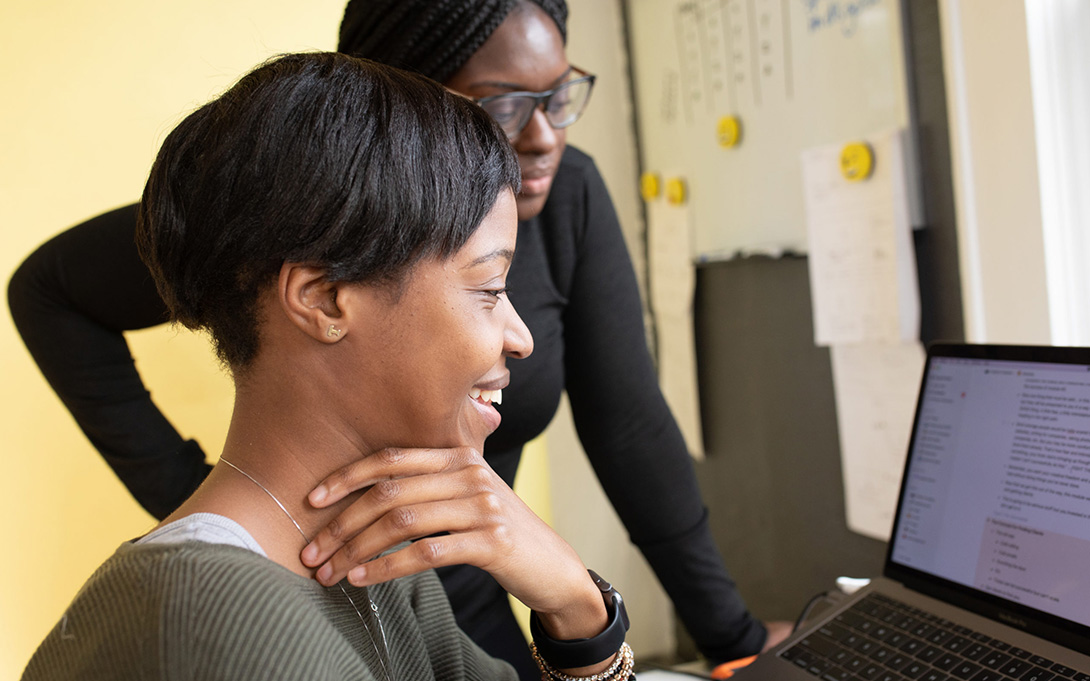
An interdisciplinary team from the University of Michigan was awarded $300,000 from the Ewing Marion Kauffman Foundation to train local residents and U-M students to provide one-on-one technology support to Detroit entrepreneurs. The project aims to better understand the types and complexity of technology support that small businesses need, along with preferences around timing and delivery.
The researchers will work with U-M alum Lutalo Sanifu (MURP ‘18) and his colleagues at Jefferson East, Inc, a nonprofit community organization committed to developing work for Detroiters and reducing barriers to small business growth and expansion.
The university project team includes Kristin Seefeldt, associate director of Poverty Solutions and associate professor of social work; Tawanna Dillahunt, associate professor at the School of Information; Julie Hui, assistant professor at the School of Information; Christie Baer, assistant director for the Center on Finance, Law & Policy at the Gerald R. Ford School of Public Policy and program director for the center’s Detroit Neighborhood Entrepreneurs Project; and Aaron Jackson, program manager of the Detroit Neighborhood Entrepreneurs Project.
“Small businesses are a key driver of economic mobility and employment in Detroit, but the digital divide prevents some businesses from reaching their full potential. This research will give us a better understanding of the technology needs of small business owners, so workforce development efforts can provide the tech support that local entrepreneurs need to thrive. We’re excited to be partnering with Jefferson East in this endeavor,” said Seefeldt, primary investigator for the research project.
The project builds on Dillahunt and Hui’s partnership with the Friends of Parkside to pilot a “community tech worker” program to assist seniors requiring technology-related support. Tech workers will be embedded at Jefferson East to develop a sustainable, useful model that will help bridge the digital divide for small businesses.
“I’m excited that we’re able to extend our Community Tech Workers pilot to provide support for local businesses,” said Dillahunt. “I hope to see Community Tech Workers embedded in every community!”
U-M’s Detroit Neighborhood Entrepreneurs Project has observed that older and lower-income business owners generally find tools like scheduling software or excel-based cash flow calculators to be difficult to use without training. Baer says assistance with using technological tools could make a big difference for small businesses.
“This pilot project fills a large gap in Detroit’s entrepreneurial landscape. When it comes to teaching tech skills, there is no substitute for one-on-one support,” Baer said. “Our hope is that this pilot will provide information that is needed for some of our Detroit partners to be able to offer individual tech support to business owners in the future.”
The U-M project was one of six in the Kauffman Foundation’s community-engaged research portfolio.
“We’re excited to support community engagement in the research process through this grant portfolio. These six projects aim to build equitable, collaborative, solution-driven initiatives between communities and researchers with the potential to advance inclusive prosperity through entrepreneurship,” said Chhaya Kolavalli, senior program officer, Knowledge Creation & Research, Entrepreneurship for the Ewing Marion Kauffman Foundation.
The Ewing Marion Kauffman Foundation is a private, nonpartisan foundation based in Kansas City, Mo., that seeks to build inclusive prosperity through a prepared workforce and entrepreneur-focused economic development.
More news from the Ford School